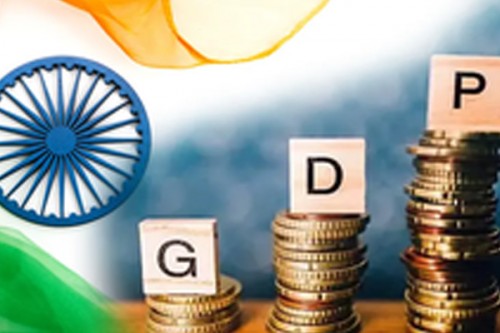Per capita nominal GDP in FY25 to grow by Rs 35,000 more than FY23: Economists

New Delhi, Jan 8 (IANS) Despite a slowdown in real GDP growth, per capita nominal GDP in India is expected to increase significantly in FY25, by at least Rs 35,000 more than FY23, economists have said.
The first advance estimate (AE) of GDP for FY25 by the National Statistical Office (NSO) indicates GDP growth at 6.4 per cent. The gross value added (GVA) growth is also estimated at 6.4 per cent. Nominal GDP growth is estimated to remain flattish, increasing by 9.7 per cent in FY25 (9.6 per cent in FY24).
“Historically, the difference between RBI’s estimate and NSO’s estimate is always in the range of 20-30 bps and hence the 6.4 per cent estimate of FY25 is along expected and reasonable lines. We, however, believe that GDP growth for FY25 could be around 6.3 per cent, with downward bias,” said Dr Soumya Kanti Ghosh, Group Chief Economic Adviser, State Bank of India.
“Buoyed by robust policy measures and overlapping phy-gital public infra creation, in lockstep with formalisation of finance, Agriculture and Allied Activities are likely to grow by 3.8 per cent in FY25 (1.4 per cent previous year),” Dr Ghosh mentioned.
Service sector, on the other hand, is likely to grow by 7.2 per cent in FY25, compared to a growth of 7.6 per cent in FY24.
The heads that have positively contributed include the government consumption with a growth of 8.5 per cent in nominal terms (4.1 per cent in real terms) while exports have also held the forte with positive growth of 8 per cent (5.9 per cent in real terms).
According to Nikhil Gupta, Chief Economist, MOFSL Group, NSO estimates suggest a revival in consumption and moderation in investments in the second half of FY25.
“Private consumption is likely to grow 7.8 per cent YoY in 2H FY25 (vs 6.7 per cent/4 per cent in 1H/FY24), govt consumption is estimated to grow 6.1 per cent in 2H (vs 2 per cent/2.5 per cent) and total investment is seen to increase 5.8 per cent vs 6.5 per cent/9.4 per cent,” said Gupta.
Rajani Sinha, Chief Economist, CareEdge Ratings, said that consumption growth is estimated to accelerate in H2 compared to H1.
“Healthy agri growth and likely moderation in food inflation should help boost consumption in the months to come. Sustained consumption growth will also help pull in private investment,” she mentioned.

|

|

